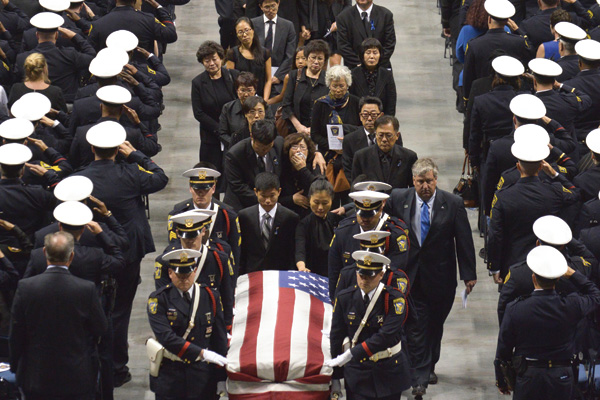A Hometown Hero
Sonny Kim, a veteran police officer killed in the line of duty, impacted his community in more than one way—as a friend, confidante, sensei and mentor.
by KARIN CHAN
“He took the time to get to know everyone.”
That was how Sonny Kim approached his role as a police officer in Cincinnati, Ohio, says his commanding supervisor and friend of nearly three decades, Capt. Jeff Butler. Whether that meant sitting on the porch of the home of someone whose neighborhood he patrolled, and conversing while sharing a glass of iced tea or lemonade, or taking a walk with the young man who looked to him as a father figure, Kim made sure to listen.
“He was a model police officer, an old-fashioned beat officer,” Butler, recalling the legacy of his colleague, told KoreAm in a phone interview, nearly two months after Kim’s death in the line of duty.
On June 19, the Cincinnati Police Department lost one of its finest when the 48-year-old Kim, a husband and father of three teenage sons, was fatally shot in broad daylight by a man who made two 911 calls to lure an officer to his location.
Working an overtime shift on a Friday morning, Kim responded to the Madisonville street corner where 21-year-old Trepierre Hummons was situated. When Kim got out of his vehicle and walked towards him, Hummons opened fire repeatedly, according to an incident narrative. Despite wearing a ballistics vest, Kim was fatally wounded.
The perpetrator was shot and killed by a second responding officer who arrived at the scene moments later and was similarly targeted by gunfire, according to the report.
Kim’s shooting, which marked the first on-duty police fatality in Cincinnati in 15 years, has been referred to by Cincinnati Police as “an ambush.” It’s unclear what motivated Hummons’ actions, though his texts to friends that morning signaled a troubled person.

A 27-year veteran of the police force and sixth-degree black belt, Kim was a fixture in the community, known affectionately as “Officer Sonny.” Described as calm and even-keeled but with a dry sense of humor, the Korean American was a doting father and beloved instructor to students at the Japanese Karate-Dojo he founded in 1996—his third home aside from his household and vocation.
Kim’s impact on the community was felt based on the sheer number of mourners, including the sea of blue uniforms, that came out to salute a fallen comrade during a funeral service on June 26 at Xavier University’s Cintas Center. The casket, draped in an American flag and hoisted by four officers on each side, was carried into the arena as roughly two dozen of the officer’s family members, including his wife and sons, parents and siblings, followed closely behind, their faces stricken with grief.
“When I grew up, I wanted to be an astronaut or a baseball player. But with Sonny, it was always one thing—that tunnel vision to be a police officer,” said his brother, Mickey, choking back tears, in his eulogy. “He was so proud to wear that uniform. He was so proud to be part of that fraternity.”
And it showed. While eligible to retire this year, having reached 25 years of service, Kim was a workhorse known rarely to take sick leave. He had received 21 letters of commendation throughout his career for exceptional performance, from his “courteous and professional assistance” locating a woman’s elderly mother one year to his “unselfish and dedicated service” during the January 1996 blizzard to his quickthinking and resourcefulness during the rescue of a man who jumped from the I-275 bridge.
But it was those everyday moments that weren’t recorded but still reached someone that stand out. One teen would call into the police station every now and again, asking for Kim, when he thought he was about to make a decision that would land him in the back of a patrol car, according to Butler.
Without fail, Officer Sonny—notably, the only officer of East Asian descent in his unit—would take a stroll with the kid to listen to him and talk one-on-one.
As someone who made it a point to patronize the establishments on his beat, Kim was a familiar face around town, who made no secret of his love for the pancakes—with their special ingredient, vanilla pudding—at one diner. “Sonny raved about them. A couple of times a week, he would go and eat the pancakes,” said Butler, chuckling. In fact, the captain was often on the receiving end of Kim’s ribbing, getting needled by the fitness buff about his own see-sawing fitness regimen.

The dedication—and lightheartedness—Kim showed on the job was also reflected in his home life, to his sons Timothy, Jacob and Joshua, and wife Jessica. Whether biking the trails or running 5Ks with his kids, sending his family goofy selfies from the office or squad car, or texting his sons just to tell them how proud he was of them, Kim doted on his loved ones while instilling a strong ethic. Dinner was at the same time every day, and there was no TV in the house because he wanted the kids to talk with one another, according to Butler.
“He was a friend and confidante to his sons. He let them make mistakes and fall, then he’d pick them back up,” said the captain.
The oldest of three sons, Kim was born on Sept. 30, 1966, in South Korea. At age 7, he came to the U.S. with his family, who chose Cincinnati to settle down in. While Kim spent his high school years and part of college in Chicago, he later returned to his hometown, enrolling at the University of Cincinnati because he loved the city and its people. He joined Cincinnati’s police force as a recruit in 1987, getting promoted five months later to police officer.
His devotion to Shotokan karate set in from an early age, when back in Korea, he was trained by a friend of his father’s, an instructor for the South Korean
Army unit near Seoul. He was loved by his students—which consisted of kids and fellow officers alike—teaching them not only the technical skills to karate, but values and life principles, according to friend Vinson Lewis, a fellow karate instructor and second-degree black belt.
“He was my best friend,” Lewis, 57, told KoreAm. “He really loved the Lord, loved his family. We would travel to tournaments together, driving 12 hours from Cincinnati to New York, and just have wonderful conversations about life. He was a real strong patriot, a wonderful man who was articulate. He did what he loved to do.”

The day of Kim’s funeral, a cavalcade consisting of 200 police motorcycles and 500 police cars made the 14-mile journey from the Cintas Center to the Gate of Heaven Catholic Cemetery—where Kim was buried as rain poured down. Along the route, bystanders lined the streets on a workday Friday.
The hearse made one stop—Kim’s karate school, where his students, wearing their karategi whites, formed a line and bowed deeply to pay their last respects to their sensei, whose classes would always end with this mantra: “Seek perfection of character. Be faithful. Endeavor. Respect others. Refrain from violent behavior.”
“It was a tragedy and a sad time for our community,” said Derek Bauman, president of the Mason, Ohio Police Association, which started a GoFundMe page to raise donations for Kim’s family. “At the same time, it was uplifting to see the community come together.”
While the Kim family has refrained from publicly discussing its deep loss, Sonny’s eldest son, Timothy, paid tribute to his father in an Instagram post published shortly after his father’s death. “Thank you for making our family and so many others feel safe … I wish I could tell you all of this in person, but I can’t,” he wrote. “I’m so proud of you and so proud to call you my father and my hero.”
___
Suevon Lee contributed reporting to this story.
This article was published in the August/September 2015 issue of KoreAm. Subscribe today! To purchase a single issue copy of the August/September issue, click the “Buy Now” button below. (U.S. customers only. Expect delivery in 5-7 business days.)







